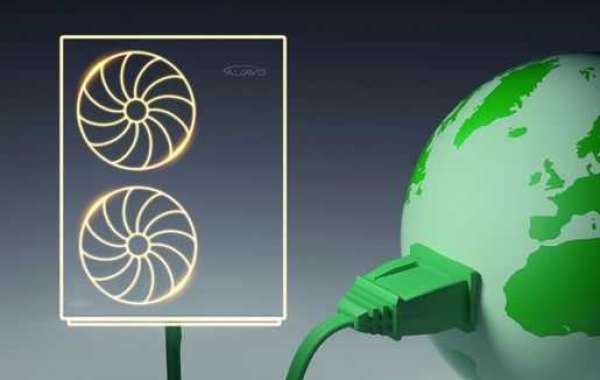An air source heat pump is an innovative and energy-efficient alternative to traditional heating and cooling systems. It works by moving heat from one location to another, instead of generating heat from a fuel source like natural gas or propane. In this article, we'll explore the science behind heat pumps, their advantages, and how they can benefit homeowners and businesses.
Science of Heat Pumps
Heat pumps work by using a small amount of energy to move heat from one location to another. They operate on the same principle as a refrigerator or air conditioner, but in reverse. Instead of removing heat from an interior space and expelling it outside, heat pumps extract heat from the outdoor air or ground and transfer it inside.
There are two types of heat pumps: air-source and ground-source. Air-source heat pumps are the most common and work by extracting heat from the outdoor air. Ground-source heat pumps, also known as geothermal heat pumps, extract heat from the ground using a series of underground pipes.
Regardless of the type of heat pump, the basic operation is the same. A refrigerant circulates between an outdoor unit and an indoor unit, absorbing heat from the outdoor air or ground and transferring it inside. The heat is then distributed throughout the home or building using a duct system or individual air handlers.
The science behind heat pumps is based on the principles of thermodynamics. Specifically, heat pumps rely on the fact that heat naturally flows from warmer to cooler spaces. By using a small amount of energy to move heat in the opposite direction, heat pumps are able to provide efficient and cost-effective heating and cooling.
Advantages of Heat Pumps
Energy Efficiency: One of the primary advantages of heat pumps is their energy efficiency. Because they don't rely on a fuel source to generate heat, they can be up to three times more efficient than traditional heating systems. This translates to lower energy bills and reduced carbon emissions.
Versatility: Heat pumps can provide both heating and cooling, making them a versatile option for year-round comfort. They can also be used to supplement existing heating and cooling systems, reducing the workload and extending their lifespan.
Quiet Operation: Heat pumps are typically quieter than traditional heating and cooling systems, making them ideal for use in residential areas or noise-sensitive environments.
Longevity: Heat pumps have a longer lifespan than traditional heating and cooling systems, with an average lifespan of 15 to 20 years. This means that homeowners and businesses can enjoy reliable and efficient heating and cooling for many years to come.
Consistent Temperature: Heat pumps provide consistent heating and cooling, eliminating hot and cold spots and maintaining a comfortable indoor temperature throughout the year.
Environmental Benefits: Heat pumps have a lower carbon footprint than traditional heating and cooling systems, making them a more environmentally friendly option. They can also be powered by renewable energy sources like solar or wind, further reducing their environmental impact.
Applications of Heat Pumps
Residential Heating and Cooling: Heat pumps are an excellent choice for residential heating and cooling, providing energy-efficient and reliable comfort throughout the year. They can be installed in both new and existing homes, and can even be used to supplement existing heating and cooling systems.
Commercial Heating and Cooling: Heat pumps are also a popular choice for commercial heating and cooling, providing efficient and cost-effective comfort for businesses of all sizes. They can be used in a variety of settings, including office buildings, retail spaces, and warehouses.
Industrial Applications: Heat pumps can be used in a variety of industrial applications, such as process heating and cooling, refrigeration, and waste heat recovery. They can also be used to provide heating and cooling for large-scale industrial processes.
One of the primary advantages of heat pumps is their ability to provide consistent temperature control in large spaces, making them an ideal choice for industrial settings where maintaining a specific temperature is critical.
Pool Heating: Heat pumps can also be used to heat swimming pools and spas, providing energy-efficient and cost-effective heating. They can extend the swimming season and allow pool owners to enjoy their pool even in colder months.
Hot Water Heating: Heat pumps can also be used for hot water heating, providing an energy-efficient alternative to traditional water heaters. They can be used in both residential and commercial settings, providing reliable and cost-effective hot water.
Agriculture: Heat pumps can also be used in agriculture to provide heating and cooling for greenhouses, livestock housing, and other agricultural applications. They can help farmers maintain consistent temperatures, improve crop yields, and reduce energy costs.
Cost and Installation
The cost of a heat pump system can vary depending on several factors, including the size of the system, the type of heat pump, and the complexity of the installation. However, heat pumps are generally more expensive than traditional heating and cooling systems, with initial costs ranging from $3,000 to $10,000.
While the initial cost may be higher, heat pumps offer long-term cost savings through reduced energy bills and increased energy efficiency. Homeowners and businesses can also take advantage of tax credits and other incentives for installing energy-efficient systems.
Installation of a heat pump system typically involves an outdoor unit, an indoor unit, and a series of ducts or air handlers. Installation can take several days and may require modifications to the existing ductwork or electrical system. It's important to choose a reputable and experienced contractor for installation to ensure that the system is properly installed and functioning efficiently.
R6t pumps offer a range of advantages for homeowners and businesses, including energy efficiency, versatility, and consistent temperature control. They can be used in a variety of applications, from residential heating and cooling to industrial processes and agriculture. While the initial cost may be higher than traditional systems, heat pumps offer long-term cost savings and environmental benefits. If you're considering a heat pump system, be sure to consult with reputable heat pump specialists to determine the best system for your needs and ensure proper installation. With a heat pump, you can enjoy reliable and efficient heating and cooling for many years to come.

 heat pump companies
heat pump companies




